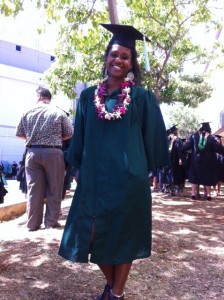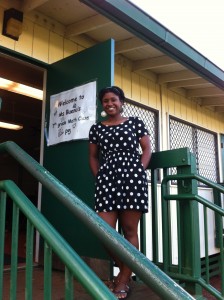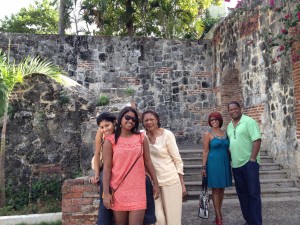 No Greatness Comes Without Risk: Carycruz Miriam Bueno
No Greatness Comes Without Risk: Carycruz Miriam Bueno
By Natasha Payés
Everyone had a hand in crafting her name. From her Indian-descent grandfather to her older sister Cruz, it was a familial effort in carefully selecting the name Carycruz Miriam Bueno. Combining her grandmothers’ names—Caridad and Cruz—which means charity and the cross, Cary’s grandfather chose Miriam, the older sister of the prophet Moses. As for her last name…well Cary must be inherently good. For many of us, it would not be an easy task to live up to such a name that sounds like it should be reserved for the Mother Teresas in our world; however, it seems as if Cary does this with ease.
As a self-identified Afro-Latina, Cary straddles two cultures, two languages and two worlds. The Dominican pitted against the American culture; the Spanish versus the English; the U.S. nationality and the immigrant experience. When she’s in the Dominican Republic visiting family, fellow Dominicans detect and point out her “American” accent. When Cary is in New York, she’s often asked, “No really, but what are you?” For some reason, her mocha complexion, her long tresses and the ability to speak Spanish throw people for a loop. “It’s a catch 22,” said Cary, “I’m neither here nor there.”
Though it’s cumbersome to balance all of her communities and identities, Cary’s insight and her Mount Holyoke education help her bridge communities and tackle some of the most complicated issues plaguing our nation.
As a rising high school senior, Carycruz had her sights set on the Ivy Leagues: Harvard, Yale, Brown—you know the type. But her sister who was studying at the University of Massachusetts Amherst told her about these amazing schools in the Pioneer Valley that were only for women.
“Cary,” said Cruz, “this is the place where you need to be.”
Although skeptical at the thought of attending a women’s college, Cary trusted her sister’s opinion and applied to Mount Holyoke and Smith. Choosing which admitted students’ weekend was a challenge—Mount Holyoke’s and Smith’s fell on the same weekend—but she chose MHC. After befriending some cool gals like Natasha Payés, Geraldine Rodriguez, and Kristin Tucker, she realized that if MHC was anything like her visit, she wanted to be there.
Fall of 2006, Carycruz jumped right in. She joined the Association of Pan African Unity and La Unidad and became the social chair, treasurer, five college representative and historian for both organizations.
“As a Black Latina, I felt very connected to both organizations and I wanted to bridge those connections,” said Cary.
Not only was it important to Cary to make meaningful connections between the two groups, but also by being a member it was her way to pay homage to those that came before her. “A lot of alums fought for us to be here…we deserved to be there [at MHC].”
When asked about classes that left lasting impressions, she joked, “Well it wasn’t my probability class.” Interestingly, it was a course she took to fulfill a distribution requirement her senior year titled Immigration Nation.
“As a senior, I thought I knew and learned everything, but that class taught me about laws and theories that have shaped our American society. I realized that there’s still more work to do.”
And she knew one area that certainly needed more work: our American education system.
Following graduation, she was placed in Hawaii as a 7th grade special education math teacher for Teach For America.
Her days began at 5 AM and concluded around 12 AM or later.
She was tasked with teaching her students 7th grade math, but many of them had learning disabilities.
Some students were at 5th grade level math, others were at the 2nd grade level.
How would she make 7th grade math accessible to all of her students who all have varying degrees of comprehension?
The pressure was on and at times Carycruz questioned why she was doing this work, but her doubts would always disappear whenever her students understood the material and Cary could see incremental improvements. Though she realizes that Teach For America is not the answer to upheave the U.S. educational system, it is an attempt to chip away at the flaws and work with the resources that they have.
Now that she is three years out of college, Cary is going back to her original plan: earning her PhD in economics. With a full-ride to Georgia State University, she plans to link her passions for economics and education in hopes to solve social issues through an economic lens.
With crafting such a name, Cary’s family set the tone for what she would experience and how she would use her gifts in this world. She would need compassion and love for others; she would need to be bold and courageous like Miriam; and she would need to take up the cross during times of darkness and uncertainty. Or as Cary would sum up in a less flowery, but powerful way: “No greatness comes without risk.”
